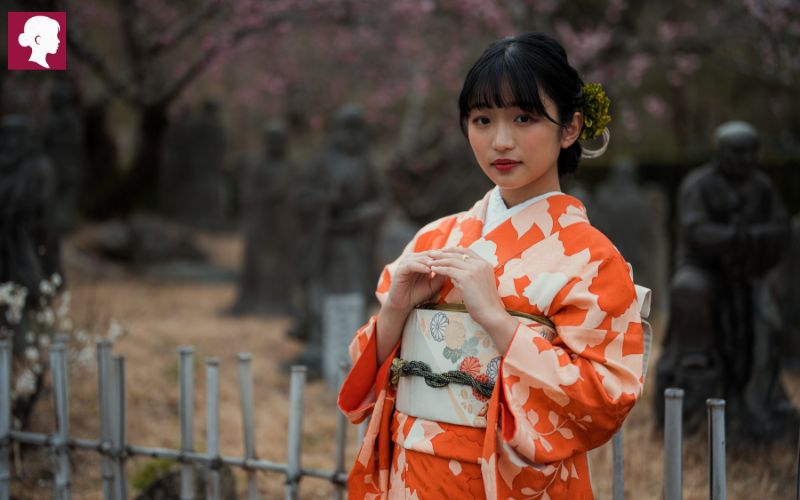Japanese culture is rich with meaning and symbolism, especially when it comes to names. Names in Japan are more than just identifiers; they often carry deep spiritual and cultural significance. Among the numerous symbolic themes found in Japanese names, the concept of death holds an important place in the culture, particularly due to the influence of Buddhist beliefs. Death-related names are rare, but they are not devoid of beauty or serenity; instead, they carry a peaceful, natural perspective on life’s transient nature.
In this article, we will delve into the fascinating world of Japanese girl names that mean death or are associated with the concept of death. These names reflect a wide range of meanings, from the end of life to spiritual transitions and the peace that follows. If you are curious about Japanese names or are seeking a name that embodies a unique, thoughtful, and spiritual meaning, this guide will provide you with an extensive list of over 230 names.
Whether you are looking for a name for a fictional character or considering a name with a deeper connection to life’s impermanence, this comprehensive list will serve as a helpful reference.
Understanding Death in Japanese Culture
In Japan, death is not merely viewed as an end but as part of a natural and sacred cycle. The idea of death is deeply intertwined with spiritual beliefs, particularly those influenced by Buddhism. Death is considered a passage or transition into another form of existence, with the soul continuing its journey in the afterlife or through reincarnation.
Names related to death in Japanese culture are often not perceived negatively but instead reflect the acceptance and understanding that death is a natural and inevitable part of life. The names that mean death or are associated with death reflect this belief. Death-related names are symbolic of peace, rest, or the spirit’s transition, rather than sorrow or grief.
The use of death-related names in Japan is not widespread, but when they are used, they carry profound significance. These names often reflect qualities like purity, serenity, and the cyclical nature of life and death.
In this article, we explore over 230 Japanese girl names that are connected to death, peace, rest, spirits, and the afterlife. From kanji for death (死) to names that symbolize endings, spirits, and eternal rest, these names provide a fascinating glimpse into the spiritual and cultural meanings behind Japanese names.
See Also: Japanese Girl Names That Mean Fire: Names with the Kanji
Japanese Names That Mean Death for Girls

Names with Kanji Representing “Death” (死)
The kanji 死 (shi) directly translates to death and is the most straightforward representation of this concept. Names that include this kanji are not used lightly and are often chosen for their spiritual significance, emphasizing the transition from life to death.
Shiko (死子)
Meaning: “Death child”
A name combining the kanji for death and child, Shiko represents the idea of death in the context of life, symbolizing the fragility and fleeting nature of human existence.
Shinobu (死信)
Meaning: “Death message”
Shinobu reflects the belief in receiving a spiritual message from the afterlife, emphasizing communication between life and death.
Shiho (死宝)
Meaning: “Death treasure”
Shiho associates death with something valuable, implying that death, while final, is an important transition, almost like a treasure.
Shiori (死織)
Meaning: “Death weave”
This name symbolizes the weaving of life and death together, suggesting that life’s end is part of a larger spiritual process.
Shina (死奈)
Meaning: “Death and peace”
Shina combines death with peace, symbolizing the acceptance and serenity that come with the end of life.
Shiho (死歩)
Meaning: “Death walk”
Shiho reflects the journey of death, as though it were a walk or a passage, signifying the calm and inevitable transition from life to death.
See Also: 83+ Japanese Girl Names Meaning Water
Names with Kanji Representing “End” or “Finish” (終)
The kanji 終 (shū) means “end” or “finish” and is often associated with the conclusion of an event, including life. These names evoke finality, peace, and completeness.

Shumei (終命)
Meaning: “End of life”
Shumei combines the kanji for end and life, symbolizing a life that has reached its natural conclusion, embodying both serenity and acceptance.
Shuko (終光)
Meaning: “End light”
Shuko represents the concept of life’s end as the arrival of light, symbolizing peace and hope that come after death.
Shura (終羅)
Meaning: “End weave”
This name suggests the idea of death as a final weave of fate, where life and death are intricately connected.
Enda (終田)
Meaning: “End field”
Enda represents a field at the end of its cycle, symbolizing the natural conclusion of life’s seasons and the peace that comes with it.
Shuma (終真)
Meaning: “True end”
Shuma suggests the end of life as a true, natural occurrence, emphasizing that death is a part of life’s truth.
Shinka (終果)
Meaning: “End fruit”
Shinka represents the end of life as the fruition of a long process, symbolizing maturity and completeness.
See Also: 82+ Japanese Girl Names Meaning Light
Names with Kanji Representing “Peace” or “Rest” (安, 眠)
In Japan, death is often connected with peace and rest. Names using the kanji 安 (peace) or 眠 (sleep) reflect the tranquil aspect of death, portraying it as a peaceful, serene end.

Anju (安寿)
Meaning: “Peaceful life”
Anju combines peace with longevity, symbolizing a peaceful end to a long and fulfilling life.
Kinen (眠焉)
Meaning: “Eternal rest”
Kinen represents the idea of eternal rest after death, symbolizing a peaceful and permanent transition to the afterlife.
Nami (安美)
Meaning: “Peaceful beauty”
Nami signifies a beautiful and peaceful life, with death seen as a calm and serene process that follows.
Yasumi (安実)
Meaning: “Peaceful truth”
Yasumi symbolizes the acceptance of death as the ultimate truth, embracing peace in the afterlife.
Nene (眠音)
Meaning: “Sleep sound”
Nene reflects the sound of sleep, symbolizing the quiet peace and rest that comes after death.
Keiko (恵子)
Meaning: “Blessed child”
Keiko represents a child who is at peace with the afterlife, reflecting a sense of grace and divine blessing.
Names with Kanji Representing “Soul” or “Spirit” (魂, 霊)
Many Japanese names related to death focus on the soul or spirit, emphasizing the idea that while the body may die, the spirit continues its journey.

Tamako (魂子)
Meaning: “Soul child”
Tamako symbolizes a pure soul that transcends death, representing a girl whose spirit is eternal.
Rei (霊)
Meaning: “Spirit”
Rei represents the spirit or soul, particularly in relation to death, symbolizing a spiritual journey beyond life.
Tama (霊真)
Meaning: “True spirit”
Tama combines the concept of a true spirit with death, reflecting the idea that the soul continues to live on after life’s end.
Reiho (霊宝)
Meaning: “Spirit treasure”
Reiho associates the soul with something precious, symbolizing a spirit that is valued and eternal.
Ikumi (生霊)
Meaning: “Living spirit”
Ikumi combines life with spirit, symbolizing the belief that the soul continues even after death, living on in another form.
Names with Kanji Representing “Light” or “Shine” (光)
Some death-related names symbolize the light or shine that comes after death, offering hope, guidance, and peace.
Hikari (光)
Meaning: “Light”
Hikari represents the light that follows after death, symbolizing hope, guidance, and the continuation of life in another form.
Akemi (明未)
Meaning: “Bright future”
Akemi suggests that death is not the end but rather a transition to a bright future, reflecting optimism and peace.
Kiyomi (清光)
Meaning: “Pure light”
Kiyomi symbolizes a pure and radiant light that shines after death, representing peace and purity.
Harumi (陽美)
Meaning: “Sunshine beauty”
Harumi evokes the warmth and beauty of the sun, symbolizing the serene transition from life to death.
Takemi (高光)
Meaning: “High light”
Takemi suggests the light of the afterlife, representing a soul that shines brightly even after death.
Names with Kanji Representing “Flower” or “Blossom” (花)
In Japan, flowers are often used to symbolize the fleeting nature of life, and death-related names that use flowers reflect the beauty and impermanence of life’s cycle.
Hanae (花恵)
Meaning: “Flower blessing”
Hanae symbolizes the beauty of a flower in full bloom, with death representing the peaceful and graceful end of life.
Fumika (芙美花)
Meaning: “Beautiful flower”
Fumika combines beauty with the image of a flower, reflecting the natural cycle of life and death.
Kaori (香花)
Meaning: “Fragrant flower”
Kaori symbolizes the fragrance and beauty of a flower, representing the peace and serenity that comes with death.
Botan (牡丹)
Meaning: “Peony flower”
Botan represents the peony, a flower that symbolizes the impermanence of life, evoking the beauty of life’s cycle.
Midori (緑花)
Meaning: “Green flower”
Midori connects the cycles of life and death, representing the growth and blooming of a flower that eventually fades.
Conclusion
Japanese names related to death carry deep spiritual significance, reflecting the belief that death is not an end but a natural transition in the cycle of life. These names symbolize peace, the spirit, rest, and the light that follows death, offering a unique perspective on life’s impermanence.
From names like Shiko and Shumei, which directly reference death and endings, to names like Hikari and Hanae, which symbolize the peaceful and beautiful transition after death, these names offer a thoughtful, serene view of life’s most inevitable event.
Choosing a name associated with death in Japanese culture is not about fear or negativity; it is about honoring the passage of life and acknowledging the beauty and peace that death can represent. These names carry a profound connection to spirituality, offering a deeper understanding of life, death, and the cycles that bind them together.




